|
|
|
Sort Order |
|
|
|
Items / Page
|
|
|
|
|
|
|
| Srl | Item |
| 1 |
ID:
098035
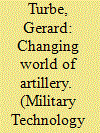

|
|
|
| 2 |
ID:
124167
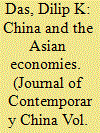

|
|
|
|
|
| Publication |
2013.
|
| Summary/Abstract |
The objective of this article is to explore the economic relationship between China and the surrounding dynamic Asian economies. It delves into China's influence over the Asian economies and whether this relationship has evolved in a market- and institution-led symbiotic manner. The three principal channels of regional integration analyzed in this article are trade, FDI and vertically integrated production networks. Another issue that this article explores is the so-called China 'threat' or 'fear' in Asia. The China threat implied that China was crowding out exports from the other Asian economies in the world market place. Also, as China became the most attractive FDI destination among developing countries, it was understood that China was receiving FDI at the expense of the Asian economies. These concerns were examined by several empirical studies and the inference was that they were exaggerated. The article concludes that China methodically expanded and deepened its economic ties with its regional neighbors. At the present juncture, China's integration with the surrounding Asian nations is deep. Both China and its dynamic Asian neighbors have benefited from this synergy.
|
|
|
|
|
|
|
|
|
|
|
|
|
|
|
|
| 3 |
ID:
121003
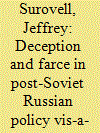

|
|
|
|
|
| Publication |
2012.
|
| Summary/Abstract |
Of all the assumptions pervading the conventional wisdom about Russian foreign policy few have been more universally accepted than Russia's supposed opposition to NATO expansion. Because Russia's principal source of profit has come from rental value of natural resources from the world market, Russia's foreign policy has largely been conducted in the interests of the exporters of those resources. Compliance with NATO expansion, Moscow's decision-makers apparently believe, can only promote the pecuniary interests of that group. Given this dynamic, and confirmed by an examination of the historical record, I conclude that Moscow's leaders have acquiesced to and even supported NATO expansion.
|
|
|
|
|
|
|
|
|
|
|
|
|
|
|
|
| 4 |
ID:
095566
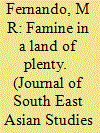

|
|
|
|
|
| Publication |
2010.
|
| Summary/Abstract |
This paper is an effort to examine the dynamics of a major famine in the private domains of Indramayu and Kandanghaur in 1883-84, which was reportedly a result of drought, but a closer look at the evidence, including a unique survey of peasant families engulfed in the famine, reveals a rather complex situation. The local peasantry confined to a narrow subsistence economy found its food supply being seriously undermined by the landlords' efforts to extract more and more rice for sale at a time when Java was being closely drawn into the world market.
|
|
|
|
|
|
|
|
|
|
|
|
|
|
|
|
| 5 |
ID:
106120
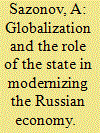

|
|
|
| 6 |
ID:
140680


|
|
|
|
|
| Publication |
New Delhi, prentice-Hall of India Private Limited, 1975.
|
| Description |
xxxviii, 339p.hbk
|
|
|
|
|
|
|
|
|
|
|
|
Copies: C:1/I:0,R:0,Q:0
Circulation
| Accession# | Call# | Current Location | Status | Policy | Location |
| 015384 | 973.92/ARO 015384 | Main | On Shelf | General | |
|
|
|
|
| 7 |
ID:
113731
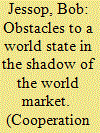

|
|
|
|
|
| Publication |
2012.
|
| Summary/Abstract |
This article explores the obstacles to the development and operation of a world state that are rooted in functional differentiation of modern societies, the ecological dominance of the broadly capitalist world market, and the inherent tendencies of all forms of governance to fail. It also highlights the challenges to the temporal as well as territorial sovereignty of states, whatever their scale of operation, due to the acceleration as well as globalization of social relations. Combining insights from Niklas Luhmann and Karl Marx, the article develops some novel arguments about multi-spatial metagovernance as an alternative approach to the problems posed by a world state as the guarantor of global social order.
|
|
|
|
|
|
|
|
|
|
|
|
|
|
|
|
| 8 |
ID:
110096


|
|
|
|
|
| Publication |
2011.
|
| Summary/Abstract |
INTERNATIONAL TRADE IN COMMODITIES is the most traditional form of international trade and makes up more than 20% of world exports. Minerals account for more than 12%, and agricultural commodities and food, for about 9%.
The main distinctive feature of mineral and agricultural resources is their uneven distribution. Their production or cultivation is mostly concentrated in a relatively few countries. The consumption of these resources is even more concentrated. Moreover, the consumption of mineral and agricultural raw materials usually does not coincide with the areas of their production and processing. There is a wide gap between producing and consuming countries, and this enhances the role of world markets in the redistribution of resources. The share of exported oil reaches 55% of its production; about 46% of all iron ore produced in the world, 43% of copper ore, 37% of zinc, etc., is exported. As for agricultural commodities, 25% of total output is supplied to the world market.
|
|
|
|
|
|
|
|
|
|
|
|
|
|
|
|
| 9 |
ID:
107350


|
|
|
| 10 |
ID:
123758
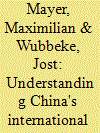

|
|
|
|
|
| Publication |
2013.
|
| Summary/Abstract |
Focusing on the relationship between oil imports and China's compromising and business-like attitude, this article shows that empirical observations do not support several commonplace assumptions that China's growing oil dependence leads to conflict scenarios. The non-escalating nature of the Chinese energy policy constitutes an intriguing puzzle. Although the country currently relies on foreign oil for more than half of its consumption, it does not possess a single overseas base, has not employed troops to secure oil supplies, and strongly relies on world markets to satisfy the growing energy demand. Instead, the main components of the Chinese policy are based on pragmatism fostering integration into existing supply systems and market institutions. This analysis, in turn, points to the importance of structural conditions within global energy politics on the one hand, and pragmatist behaviour on the other, rather than internal motivations or strategic intentions, in order to understand the evolution of China's energy policies. Finally, we briefly discuss the possibility of a reverse dynamic-possibly emerging due to a changing regional or global environment.
|
|
|
|
|
|
|
|
|
|
|
|
|
|
|
|
| 11 |
ID:
132507
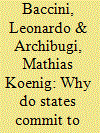

|
|
|
|
|
| Publication |
2014.
|
| Summary/Abstract |
Ratifying core conventions adopted by the International Labor Organization (ILO) creates legal obligations to improve labor standards in the domestic economy, notably with regard to union rights, minimum age and discrimination in employment, and forced labor. Why and when do states choose to ratify them? Two influential theoretical approaches lead to the expectation that states are influenced by the ratification behavior of other states. Drawing on rationalist institutionalism, the authors expect states to use institutions such as the ILO to improve or consolidate their preferred standards domestically while reducing the risk of suffering competitive disadvantages in world markets. In this view, ILO conventions are devices for the prevention and mitigation of regulatory races to the bottom among trade rivals. Drawing on sociological institutionalism, they expect states to ratify ILO conventions if doing so conforms to a norm of appropriate behavior that is prevalent in a state's peer groups. This article develops observable implications of these hypotheses and tests them by applying spatial regression models to seven core ILO conventions and 187 countries between 1948 and 2009. The analysis yields strong evidence in support of both hypotheses.
|
|
|
|
|
|
|
|
|
|
|
|
|
|
|
|
| 12 |
ID:
127688


|
|
|
|
|
| Publication |
2014.
|
| Summary/Abstract |
This article provides a new synthesis on the origins of self-management in Yugoslavia on the basis of new archival research. It rejects the dominant view in the historiography that self-management arose merely as an ideological justification for the split with Stalin's USSR in 1948. Rather, it demonstrates that the introduction of workers' councils was part of an elaborate effort on the part of the Communist leadership to return to its pre-1948, proto-'reform Communist' strategy that was remarkably open to interaction with the world market. This is shown to have implications for understanding Yugoslavia, Eastern Europe, the Cold War and Communism.
|
|
|
|
|
|
|
|
|
|
|
|
|
|
|
|
|
|
|
|
|